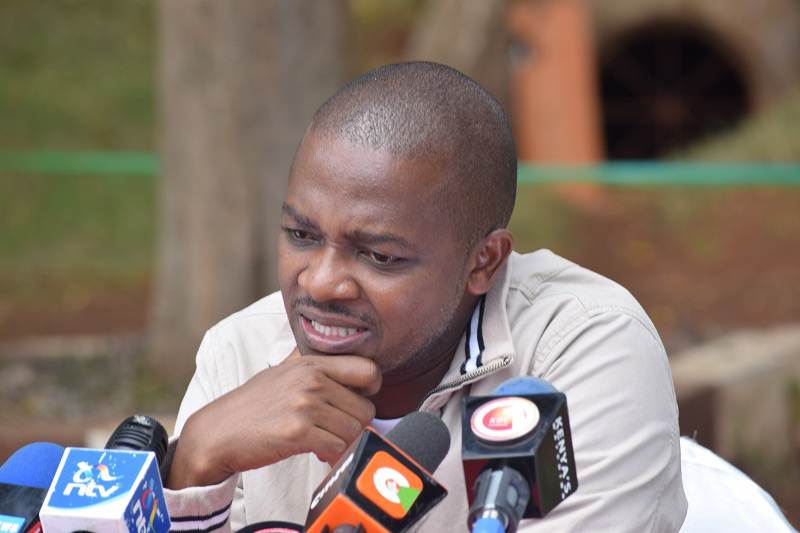The Sports Disputes Tribunal has annulled Football Kenya Federation elections held on the 23 November 2019 and cancelled the planned national exercise scheduled for 7 December.
The tribunal found that the elections board and the elections rules were illegally done.
It’s a major setback for Football Kenya Federation president Nick Mwendwa following the ruling that found the entire elections exercise was null and void, ordering the federation to “engage it’s stakeholders in public participation in the formulation of the Electoral Code of Football Kenya Federation 2019.”
A three-member panel led by chairman John Ohaga, Njeri Onyango and Mary Kimani ordered the electoral Board was improperly constituted due to ineligibility of its chairman Edwin Wamukoya and Ms Elynah Sifuna-Shiveka.
Further orders include the maintenance of the status quo at the FKF national executive committee until fresh elections are held in accordance with all laws, regulations, statutes and statutes.
“We find that the process of elections has been marred and the resultant results of this process are therefore null and void,” ruled the tribunal in a verdict contained on a 27-page document.
“As Chief Justice D Maraga stated in Raila Odinga (Supra), elections are a process, not an event. The sanctity of of the process of elections is what validates the results of the elections.”
Four broad areas
The original petition was filed by Jared Nyauma Ondieki, the chairman of Nyamira sub-branch, and a further application done jointly by Sam Nyamweya, Lordvick Aduda, Steve Mburu, Alex Ole Magelo, Angeline Elijah and Moses Akaranga – all aspirants for national office in the elections.
During the hearing held a fortnight ago, the parties had made their oral submissions, with FKF lawyers having a torrid time responding to the issues raised by the applicants, who had summarised their issues into four broad areas, namely jurisdiction, locus standi, public participation and legibility of two members of the electoral board.
“The applicants submitted that they sought the orders on grounds that the Electoral Code was adopted without the required stakeholder engagement, the choice of the members of the electoral Board lacked transparency and was done without the required stakeholder engagement,” read part of the ruling.
“Some members of the Board are ineligible for membership by reason of conflict of interest and mandatory prohibitions under the FIFA Electoral Code and the electoral code has provisions violating the FIFA Standard electoral code.”
The tribunal ruled, in response to FKF objection to jurisdiction, locus standi for the applicants as well as application of the principles of public participation; that it did have both appellate and first-instance jurisdiction to hear such matters as was before it.
“The argument by the respondents that the electoral Board has the first-instance jurisdiction to hear these appeals would expose the parties to an unfair judicial forum as the legality of the Constitution of the board is in itself a question before the tribunal.
“The tribunal recognizes that the FKF is itself a party in both appeals and fully abides by the principles of natural justice that requires that a party cannot be be judge in its own case. Were the disputes to be referred to any internal organ within the FKF for resolution, it would amount to unfair resolution as there would be reasonable ground to presume bias on the part of FKF.”
Formulation of electoral code
On the question of eligibility of Shiveka and Wamukoya, the tribunal ruled that the duo were ineligible by virtue of their position as a member of the SDT and having served in the electoral Board for the last elections in 2016 respectively.
On public participation in the formulation of the electoral code and appointment of its members, the tribunal found “there was no evidence to show how branches facilitated the dissemination of the code downwards and views on the same”.
“The respondent has failed to demonstrate how public participation of its stakeholders was invited, facilitated and conducted and the tribunal is impelled to the conclusion that there was no sufficient public participation.”
Additional reporting Kurunzi



CAF Confederation Cup
Simba book final spot in CAF Confederation cup
Must See
-


AFRICA
/ 5 years agoSierra Leone FA President Isha Johansen endorses Patrice Motsepe for CAF President
Sierra Leone FA President who also doubles up as CAF Executive Council member Madam...
-


Football
/ 5 years agoIT JUST CAN NOT BE – AN AFRICA FULL OF MORONS?
By John De Mathews, There is an eerie silence around Africa, and it is...














